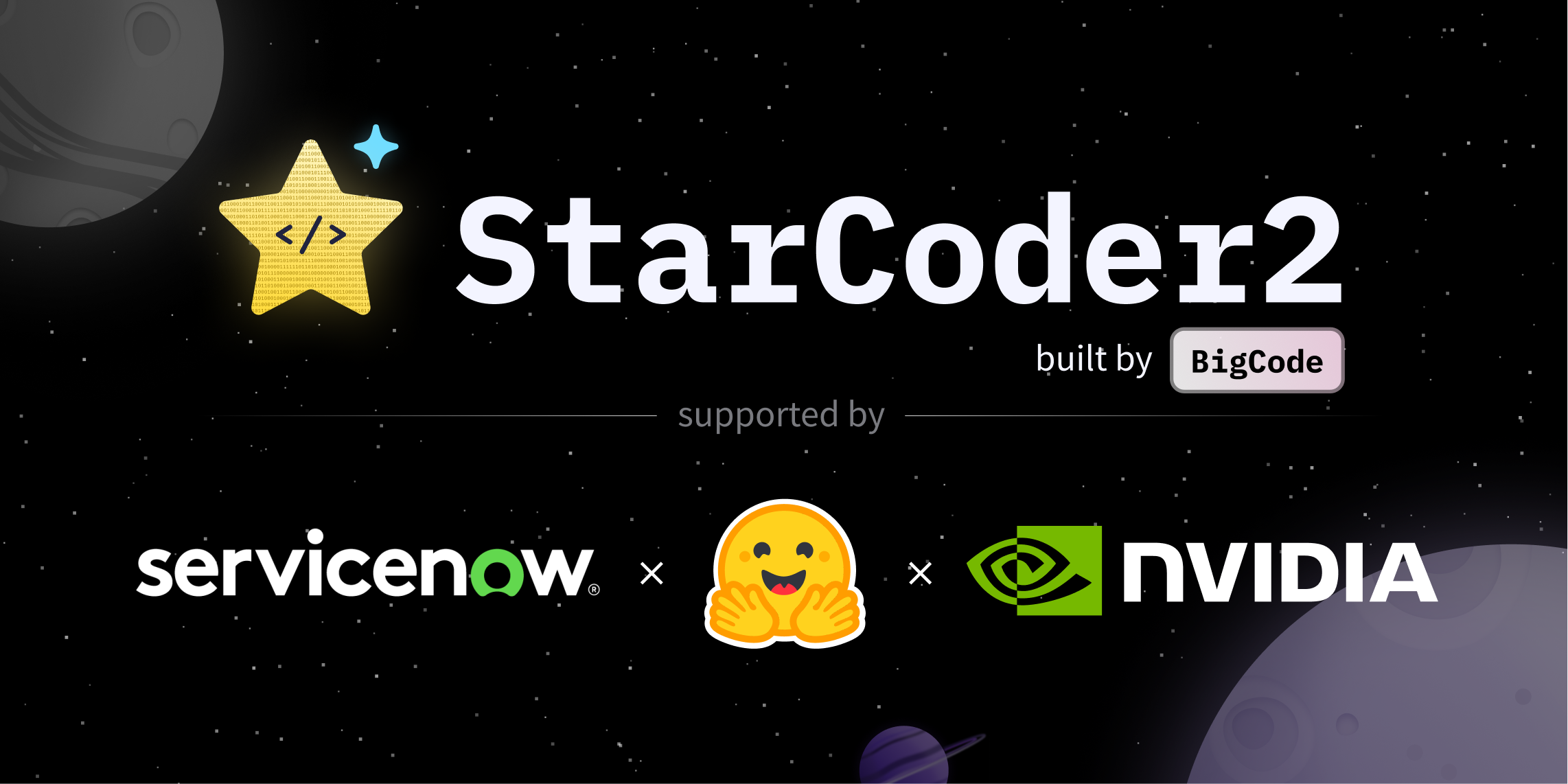StarCoder2 - llamafile
- Model creator: bigcode
- Original model:
Mozilla packaged starcoder2 into executable weights that we call llamafiles. This gives you the easiest fastest way to use the model on Linux, MacOS, Windows, FreeBSD, OpenBSD and NetBSD systems you control on both AMD64 and ARM64.
Software Last Updated: 2024-11-23
Quickstart
To get started, run:
wget https://huggingface.co/Mozilla/starcoder2-llamafile/resolve/main/starcoder2-7b.Q6_K.llamafile
chmod +x starcoder2-7b.Q6_K.llamafile
./starcoder2-7b.Q6_K.llamafile
This is a base model, so it'll behave as a text completion interface rather than a chatbot. In the CLI chatbot, you should type in your prefix text and press enter. If you click the URL to use the web GUI then you should press the "completion" radio button at the top of the page, to put the web UI in completion (rather than chatbot) mode.
For further information, please see the llamafile README.
StarCoder2

Table of Contents
Model Summary
StarCoder2-15B model is a 15B parameter model trained on 600+ programming languages from The Stack v2, with opt-out requests excluded. The model uses Grouped Query Attention, a context window of 16,384 tokens with a sliding window attention of 4,096 tokens, and was trained using the Fill-in-the-Middle objective on 4+ trillion tokens.
The model was trained with NVIDIA NeMo™ Framework using the NVIDIA Eos Supercomputer built with NVIDIA DGX H100 systems.
- Project Website: bigcode-project.org
- Paper: Link
- Point of Contact: [email protected]
- Languages: 600+ Programming languages
Use
Intended use
The model was trained on GitHub code as well as additional selected data sources such as Arxiv and Wikipedia. As such it is not an instruction model and commands like "Write a function that computes the square root." do not work well.
Generation
Here are some examples to get started with the model. You can find a script for fine-tuning in StarCoder2's GitHub repository.
First, make sure to install transformers from source:
pip install git+https://github.com/huggingface/transformers.git
Running the model on CPU/GPU/multi GPU
- Using full precision
# pip install git+https://github.com/huggingface/transformers.git # TODO: merge PR to main
from transformers import AutoModelForCausalLM, AutoTokenizer
checkpoint = "bigcode/starcoder2-15b"
device = "cuda" # for GPU usage or "cpu" for CPU usage
tokenizer = AutoTokenizer.from_pretrained(checkpoint)
# for multiple GPUs install accelerate and do `model = AutoModelForCausalLM.from_pretrained(checkpoint, device_map="auto")`
model = AutoModelForCausalLM.from_pretrained(checkpoint).to(device)
inputs = tokenizer.encode("def print_hello_world():", return_tensors="pt").to(device)
outputs = model.generate(inputs)
print(tokenizer.decode(outputs[0]))
- Using
torch.bfloat16
# pip install accelerate
import torch
from transformers import AutoTokenizer, AutoModelForCausalLM
checkpoint = "bigcode/starcoder2-15b"
tokenizer = AutoTokenizer.from_pretrained(checkpoint)
# for fp16 use `torch_dtype=torch.float16` instead
model = AutoModelForCausalLM.from_pretrained(checkpoint, device_map="auto", torch_dtype=torch.bfloat16)
inputs = tokenizer.encode("def print_hello_world():", return_tensors="pt").to("cuda")
outputs = model.generate(inputs)
print(tokenizer.decode(outputs[0]))
>>> print(f"Memory footprint: {model.get_memory_footprint() / 1e6:.2f} MB")
Memory footprint: 32251.33 MB
Quantized Versions through bitsandbytes
- Using 8-bit precision (int8)
# pip install bitsandbytes accelerate
from transformers import AutoTokenizer, AutoModelForCausalLM, BitsAndBytesConfig
# to use 4bit use `load_in_4bit=True` instead
quantization_config = BitsAndBytesConfig(load_in_8bit=True)
checkpoint = "bigcode/starcoder2-15b"
tokenizer = AutoTokenizer.from_pretrained(checkpoint)
model = AutoModelForCausalLM.from_pretrained(checkpoint, quantization_config=quantization_config)
inputs = tokenizer.encode("def print_hello_world():", return_tensors="pt").to("cuda")
outputs = model.generate(inputs)
print(tokenizer.decode(outputs[0]))
>>> print(f"Memory footprint: {model.get_memory_footprint() / 1e6:.2f} MB")
# load_in_8bit
Memory footprint: 16900.18 MB
# load_in_4bit
>>> print(f"Memory footprint: {model.get_memory_footprint() / 1e6:.2f} MB")
Memory footprint: 9224.60 MB
Attribution & Other Requirements
The pretraining dataset of the model was filtered for permissive licenses and code with no license only. Nevertheless, the model can generate source code verbatim from the dataset. The code's license might require attribution and/or other specific requirements that must be respected. We provide a search index that let's you search through the pretraining data to identify where generated code came from and apply the proper attribution to your code.
Limitations
The model has been trained on source code from 600+ programming languages. The predominant language in source is English although other languages are also present. As such the model is capable to generate code snippets provided some context but the generated code is not guaranteed to work as intended. It can be inefficient, contain bugs or exploits. See the paper for an in-depth discussion of the model limitations.
Training
Model
- Architecture: Transformer decoder with grouped-query and sliding window attention and Fill-in-the-Middle objective
- Pretraining steps: 1 million
- Pretraining tokens: 4+ trillion
- Precision: bfloat16
Hardware
- GPUs: 1024 x H100
Software
- Framework: NeMo Framework
- Neural networks: PyTorch
License
The model is licensed under the BigCode OpenRAIL-M v1 license agreement. You can find the full agreement here.
Citation
@misc{lozhkov2024starcoder,
title={StarCoder 2 and The Stack v2: The Next Generation},
author={Anton Lozhkov and Raymond Li and Loubna Ben Allal and Federico Cassano and Joel Lamy-Poirier and Nouamane Tazi and Ao Tang and Dmytro Pykhtar and Jiawei Liu and Yuxiang Wei and Tianyang Liu and Max Tian and Denis Kocetkov and Arthur Zucker and Younes Belkada and Zijian Wang and Qian Liu and Dmitry Abulkhanov and Indraneil Paul and Zhuang Li and Wen-Ding Li and Megan Risdal and Jia Li and Jian Zhu and Terry Yue Zhuo and Evgenii Zheltonozhskii and Nii Osae Osae Dade and Wenhao Yu and Lucas Krauß and Naman Jain and Yixuan Su and Xuanli He and Manan Dey and Edoardo Abati and Yekun Chai and Niklas Muennighoff and Xiangru Tang and Muhtasham Oblokulov and Christopher Akiki and Marc Marone and Chenghao Mou and Mayank Mishra and Alex Gu and Binyuan Hui and Tri Dao and Armel Zebaze and Olivier Dehaene and Nicolas Patry and Canwen Xu and Julian McAuley and Han Hu and Torsten Scholak and Sebastien Paquet and Jennifer Robinson and Carolyn Jane Anderson and Nicolas Chapados and Mostofa Patwary and Nima Tajbakhsh and Yacine Jernite and Carlos Muñoz Ferrandis and Lingming Zhang and Sean Hughes and Thomas Wolf and Arjun Guha and Leandro von Werra and Harm de Vries},
year={2024},
eprint={2402.19173},
archivePrefix={arXiv},
primaryClass={cs.SE}
}
- Downloads last month
- 171